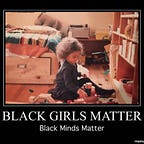Yes, Slavery Happened in the Caribbean Too
This is really just a short blog post to clear something up:
One of my last names is Prescod. Prescod is the family name of the English-descent white slave holder that owned my mother’s paternal great great grandfather in Barbados.
My maternal grandmother’s maiden name was Gouke. It’s the name of the (possibly Jewish) Dutch-descent family who owned her great grandparents in Barbados.
My paternal step-father’s last name was James. It’s the name of the English-descent family who owned his grandparents in Trinidad.
When my mom left Barbados in 1961, it was still a British colony. Their fiscal resources were still being usurped by the crown.
When my grandmother left Barbados on her birthday, it wasn’t because she was rich and was hoping to capitalize on this in the U.S. It was because the legacy of slavery and colonialism meant that Black Bajans didn’t always have enough to eat.
Here is the story of Barbados, my mom’s home country, according to the BBC:
Barbados quickly acquired the largest white population of any of the English colonies in the Americas. In many respects, Barbados became the springboard for English colonisation in the Americas, playing a leading role in the settlement of Jamaica and the Carolinas, and sending a constant flow of settlers to other areas throughout the seventeenth and early eighteenth centuries.
However as the cost of white labour in England went up, planters, on the advice of Dutch and Sephardic merchants, turned to West Africa for their source of manpower. Black slaves were imported in large numbers from the Gold Coast region in particular, especially from what is today the country of Ghana. The Asante, Ewe, Fon and Fante peoples provided the bulk of imports into Barbados. Nigeria also provided slaves for Barbados, the Yoruba, Efik, Igbo and Ibibio being the main ethnic groups targeted.
Slaves in the American south who “misbehaved” were sent to Barbados and Jamaica, where slavery was generally considered to be more brutal and punishing than American slavery. Think about what that means.
After the American Revolution cut the English off from U.S. slavery profits, the Caribbean plantations continued to be a source. Read Jane Austen’s Mansfield Park if you want to hear how well they lived off that money.
After slavery ended, it was nearly a century and a lot of struggle before a large portion of the Barbados population had access to any semblance of education.
In the 20th century, Barbados became an exoticized playground for rich Americans (white AND Black) to take vacations and condescendingly commodify local culture.
So, stop saying that Black Caribbean people aren’t descendants of slaves. Don’t tell me that Barbados and Bajans haven’t been affected by colonialism, white supremacy and American imperialist attitudes toward the Global South (attitudes that are not held just by white people) because it’s bullshit.
The same goes for the entire rest of the West Indies, especially Haiti, which has been robbed into poverty not just by France but also the United States. Secretary of the Navy Franklin Roosevelt under President Theodore Roosevelt invaded Haiti to take the theft over from France.
Stop the ahistoric bullshitting. Please. It makes my vulcan-brain hurt. But it also hurts my heart, that some people would be so desperate to deny others their history.
There’s more I could say here, about the Jamaicans and Bajans who were shipped to Nova Scotia as cheap labor. (So, I’m looking at you as well, Canada.)
I could talk about how much Black Americans look to Marcus Garvey, Malcolm X, Stokely Carmichael, and C.L.R. James (yeah, the James I mentioned above) — all people with Caribbean roots — as reference points in Black liberation.
I could talk about why my Grandpa Nello was a Pan Africanist and not just a Trinidadianist.
It was not so that Black Americans who have built their Black studies programs and Black consciousness on his work could try to exclude Black Caribbean and Black African people from the conversation, as if our history never happened, as if our skin was not also in the game.
My middle name is Sojourner for Sojourner Truth, and her first language was Dutch, just like my grandmother’s Bajan ancestors’ first language.
You cannot separate me from Sojourner Truth, no matter how hard you try.
